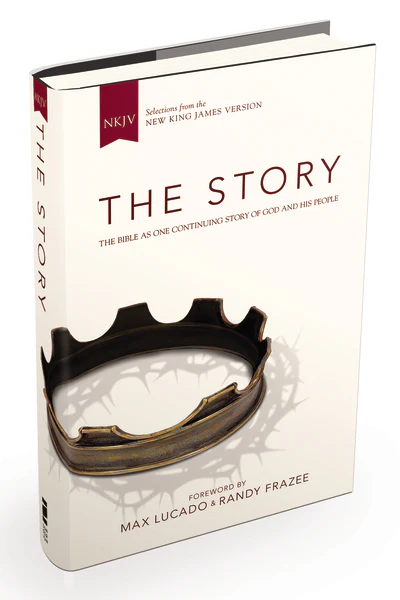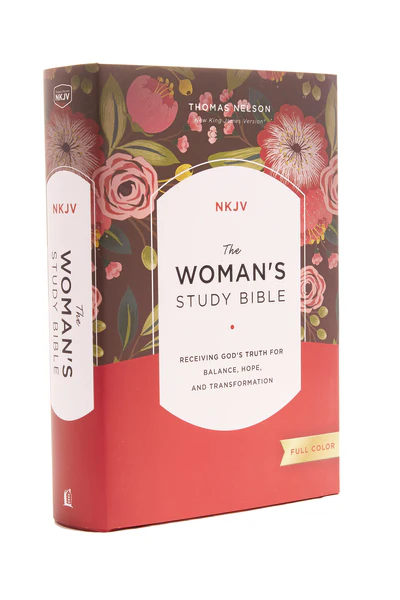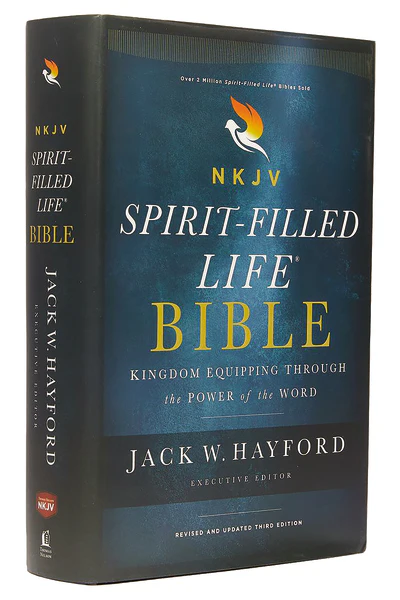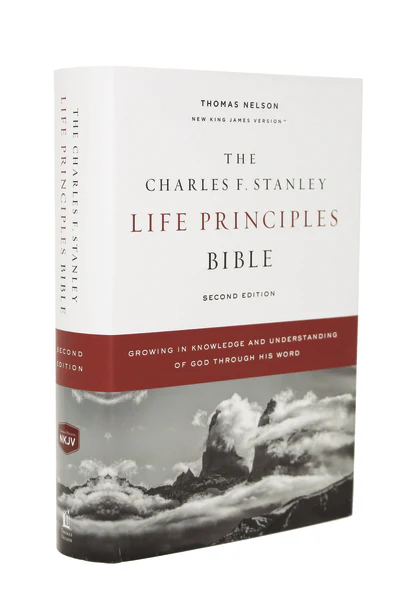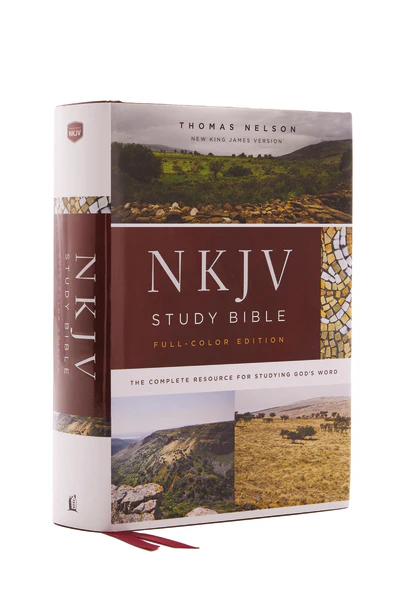Hebrews 6-9
New King James Version
The Peril of Not Progressing
6 Therefore, (A)leaving the discussion of the elementary principles of Christ, let us go on to [a]perfection, not laying again the foundation of repentance from (B)dead works and of faith toward God, 2 (C)of the doctrine of baptisms, (D)of laying on of hands, (E)of resurrection of the dead, (F)and of eternal judgment. 3 And this [b]we will do if God permits.
4 For it is impossible for those who were once enlightened, and have tasted (G)the heavenly gift, and (H)have become partakers of the Holy Spirit, 5 and have tasted the good word of God and the powers of the age to come, 6 [c]if they fall away, to renew them again to repentance, (I)since they crucify again for themselves the Son of God, and put Him to an open shame.
7 For the earth which drinks in the rain that often comes upon it, and bears herbs useful for those by whom it is cultivated, (J)receives blessing from God; 8 (K)but if it bears thorns and briers, it is rejected and near to being cursed, whose end is to be burned.
A Better Estimate
9 But, beloved, we are confident of better things concerning you, yes, things that accompany salvation, though we speak in this manner. 10 For (L)God is not unjust to forget (M)your work and [d]labor of love which you have shown toward His name, in that you have (N)ministered to the saints, and do minister. 11 And we desire that each one of you show the same diligence (O)to the full assurance of hope until the end, 12 that you do not become [e]sluggish, but imitate those who through faith and patience (P)inherit the promises.
God’s Infallible Purpose in Christ
13 For when God made a promise to Abraham, because He could swear by no one greater, (Q)He swore by Himself, 14 saying, (R)“Surely blessing I will bless you, and multiplying I will multiply you.” 15 And so, after he had patiently endured, he obtained the (S)promise. 16 For men indeed swear by the greater, and (T)an oath for confirmation is for them an end of all dispute. 17 Thus God, determining to show more abundantly to (U)the heirs of promise (V)the [f]immutability of His counsel, [g]confirmed it by an oath, 18 that by two [h]immutable things, in which it is impossible for God to (W)lie, we [i]might have strong consolation, who have fled for refuge to lay hold of the hope (X)set before us.
19 This hope we have as an anchor of the soul, both sure and steadfast, (Y)and which enters the Presence behind the veil, 20 (Z)where the forerunner has entered for us, even Jesus, (AA)having become High Priest forever according to the order of Melchizedek.
The King of Righteousness(AB)
7 For this (AC)Melchizedek, king of Salem, priest of the Most High God, who met Abraham returning from the slaughter of the kings and blessed him, 2 to whom also Abraham gave a tenth part of all, first being translated “king of righteousness,” and then also king of Salem, meaning “king of peace,” 3 without father, without mother, without genealogy, having neither beginning of days nor end of life, but made like the Son of God, remains a priest continually.
4 Now consider how great this man was, to whom even the patriarch Abraham gave a tenth of the [j]spoils. 5 And indeed (AD)those who are of the sons of Levi, who receive the priesthood, have a commandment to receive tithes from the people according to the law, that is, from their brethren, though they have come from the loins of Abraham; 6 but he whose genealogy is not derived from them received tithes from Abraham (AE)and blessed (AF)him who had the promises. 7 Now beyond all contradiction the lesser is blessed by the better. 8 Here mortal men receive tithes, but there he receives them, (AG)of whom it is witnessed that he lives. 9 Even Levi, who receives tithes, paid tithes through Abraham, so to speak, 10 for he was still in the loins of his father when Melchizedek met him.
Need for a New Priesthood(AH)
11 (AI)Therefore, if perfection were through the Levitical priesthood (for under it the people received the law), what further need was there that another priest should rise according to the order of Melchizedek, and not be called according to the order of Aaron? 12 For the priesthood being changed, of necessity there is also a change of the law. 13 For He of whom these things are spoken belongs to another tribe, from which no man has [k]officiated at the altar.
14 For it is evident that (AJ)our Lord arose from (AK)Judah, of which tribe Moses spoke nothing concerning [l]priesthood. 15 And it is yet far more evident if, in the likeness of Melchizedek, there arises another priest 16 who has come, not according to the law of a fleshly commandment, but according to the power of an endless life. 17 For [m]He testifies:
(AL)“You are a priest forever
According to the order of Melchizedek.”
18 For on the one hand there is an annulling of the former commandment because of (AM)its weakness and unprofitableness, 19 for (AN)the law made nothing [n]perfect; on the other hand, there is the bringing in of (AO)a better hope, through which (AP)we draw near to God.
Greatness of the New Priest
20 And inasmuch as He was not made priest without an oath 21 (for they have become priests without an oath, but He with an oath by Him who said to Him:
(AQ)“The Lord has sworn
And will not relent,
‘You are a priest [o]forever
According to the order of Melchizedek’ ”),
22 by so much more Jesus has become a [p]surety of a (AR)better covenant.
23 Also there were many priests, because they were prevented by death from continuing. 24 But He, because He continues forever, has an unchangeable priesthood. 25 Therefore He is also (AS)able to save [q]to the uttermost those who come to God through Him, since He always lives (AT)to make intercession for them.
26 For such a High Priest was fitting for us, (AU)who is holy, [r]harmless, undefiled, separate from sinners, (AV)and has become higher than the heavens; 27 who does not need daily, as those high priests, to offer up sacrifices, first for His (AW)own sins and then for the people’s, for this He did once for all when He offered up Himself. 28 For the law appoints as high priests men who have weakness, but the word of the oath, which came after the law, appoints the Son who has been perfected forever.
The New Priestly Service
8 Now this is the main point of the things we are saying: We have such a High Priest, (AX)who is seated at the right hand of the throne of the Majesty in the heavens, 2 a Minister of (AY)the [s]sanctuary and of (AZ)the true tabernacle which the Lord erected, and not man.
3 For (BA)every high priest is appointed to offer both gifts and sacrifices. Therefore (BB)it is necessary that this One also have something to offer. 4 For if He were on earth, He would not be a priest, since there are priests who offer the gifts according to the law; 5 who serve (BC)the copy and (BD)shadow of the heavenly things, as Moses was divinely instructed when he was about to make the tabernacle. For He said, (BE)“See that you make all things according to the pattern shown you on the mountain.” 6 But now (BF)He has obtained a more excellent ministry, inasmuch as He is also Mediator of a (BG)better covenant, which was established on better promises.
A New Covenant(BH)
7 For if that (BI)first covenant had been faultless, then no place would have been sought for a second. 8 Because finding fault with them, He says: (BJ)“Behold, the days are coming, says the Lord, when I will make a new covenant with the house of Israel and with the house of Judah— 9 not according to the covenant that I made with their fathers in the day when I took them by the hand to lead them out of the land of Egypt; because they did not continue in My covenant, and I disregarded them, says the Lord. 10 For this is the covenant that I will make with the house of Israel after those days, says the (BK)Lord: I will put My laws in their mind and write them on their hearts; and (BL)I will be their God, and they shall be My people. 11 (BM)None of them shall teach his neighbor, and none his brother, saying, ‘Know the (BN)Lord,’ for all shall know Me, from the least of them to the greatest of them. 12 For I will be merciful to their unrighteousness, (BO)and their sins [t]and their lawless deeds I will remember no more.”
13 (BP)In that He says, “A new covenant,” He has made the first obsolete. Now what is becoming obsolete and growing old is ready to vanish away.
The Earthly Sanctuary(BQ)
9 Then indeed, even the first covenant had ordinances of divine service and (BR)the earthly sanctuary. 2 For a tabernacle was prepared: the first part, in which was the lampstand, the table, and the showbread, which is called the [u]sanctuary; 3 (BS)and behind the second veil, the part of the tabernacle which is called the Holiest of All, 4 which had the (BT)golden censer and (BU)the ark of the covenant overlaid on all sides with gold, in which were (BV)the golden pot that had the manna, (BW)Aaron’s rod that budded, and (BX)the tablets of the covenant; 5 and (BY)above it were the cherubim of glory overshadowing the mercy seat. Of these things we cannot now speak in detail.
Limitations of the Earthly Service
6 Now when these things had been thus prepared, (BZ)the priests always went into the first part of the tabernacle, performing the services. 7 But into the second part the high priest went alone (CA)once a year, not without blood, which he offered for (CB)himself and for the people’s sins committed in ignorance; 8 the Holy Spirit indicating this, that (CC)the way into the Holiest of All was not yet made manifest while the first tabernacle was still standing. 9 It was symbolic for the present time in which both gifts and sacrifices are offered (CD)which cannot make him who performed the service perfect in regard to the conscience— 10 concerned only with (CE)foods and drinks, (CF)various [v]washings, (CG)and fleshly ordinances imposed until the time of reformation.
The Heavenly Sanctuary
11 But Christ came as High Priest of (CH)the good things [w]to come, with the greater and more perfect tabernacle not made with hands, that is, not of this creation. 12 Not (CI)with the blood of goats and calves, but (CJ)with His own blood He entered the Most Holy Place (CK)once for all, (CL)having obtained eternal redemption. 13 For if (CM)the blood of bulls and goats and (CN)the ashes of a heifer, sprinkling the unclean, [x]sanctifies for the [y]purifying of the flesh, 14 how much more shall the blood of Christ, who through the eternal Spirit offered Himself without [z]spot to God, (CO)cleanse your conscience from (CP)dead works (CQ)to serve the living God? 15 And for this reason (CR)He is the Mediator of the new covenant, by means of death, for the redemption of the transgressions under the first covenant, that (CS)those who are called may receive the promise of the eternal inheritance.
The Mediator’s Death Necessary
16 For where there is a testament, there must also of necessity be the death of the testator. 17 For (CT)a testament is in force after men are dead, since it has no power at all while the testator lives. 18 (CU)Therefore not even the first covenant was dedicated without blood. 19 For when Moses had spoken every [aa]precept to all the people according to the law, (CV)he took the blood of calves and goats, (CW)with water, scarlet wool, and hyssop, and sprinkled both the book itself and all the people, 20 saying, (CX)“This is the (CY)blood of the covenant which God has commanded you.” 21 Then likewise (CZ)he sprinkled with blood both the tabernacle and all the vessels of the ministry. 22 And according to the law almost all things are [ab]purified with blood, and (DA)without shedding of blood there is no [ac]remission.
Greatness of Christ’s Sacrifice
23 Therefore it was necessary that (DB)the copies of the things in the heavens should be [ad]purified with these, but the heavenly things themselves with better sacrifices than these. 24 For (DC)Christ has not entered the holy places made with hands, which are [ae]copies of (DD)the true, but into heaven itself, now (DE)to appear in the presence of God for us; 25 not that He should offer Himself often, as (DF)the high priest enters the Most Holy Place every year with blood of another— 26 He then would have had to suffer often since the foundation of the world; but now, once at the end of the ages, He has appeared to put away sin by the sacrifice of Himself. 27 (DG)And as it is appointed for men to die once, (DH)but after this the judgment, 28 so (DI)Christ was (DJ)offered once to bear the sins (DK)of many. To those who (DL)eagerly wait for Him He will appear a second time, apart from sin, for salvation.
Footnotes
- Hebrews 6:1 maturity
- Hebrews 6:3 M let us do
- Hebrews 6:6 Or and have fallen away
- Hebrews 6:10 NU omits labor of
- Hebrews 6:12 lazy
- Hebrews 6:17 unchangeableness of His purpose
- Hebrews 6:17 guaranteed
- Hebrews 6:18 unchangeable
- Hebrews 6:18 M omits might
- Hebrews 7:4 plunder
- Hebrews 7:13 served
- Hebrews 7:14 NU priests
- Hebrews 7:17 NU it is testified
- Hebrews 7:19 complete
- Hebrews 7:21 NU ends the quotation after forever.
- Hebrews 7:22 guarantee
- Hebrews 7:25 completely or forever
- Hebrews 7:26 innocent
- Hebrews 8:2 Lit. holies
- Hebrews 8:12 NU omits and their lawless deeds
- Hebrews 9:2 holy place, lit. holies
- Hebrews 9:10 Lit. baptisms
- Hebrews 9:11 NU that have come
- Hebrews 9:13 sets apart
- Hebrews 9:13 cleansing
- Hebrews 9:14 blemish
- Hebrews 9:19 command
- Hebrews 9:22 cleansed
- Hebrews 9:22 forgiveness
- Hebrews 9:23 cleansed
- Hebrews 9:24 representations
Scripture taken from the New King James Version®. Copyright © 1982 by Thomas Nelson. Used by permission. All rights reserved.
Bible Gateway Recommends
